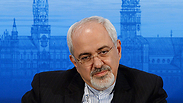
Iranian Foreign Minister Zarif
צילום: AFP
Israel needs to be smart on Iran
Op-ed: The disasterous attempt to sway American policy on Iran's nuclear program seems to have resonated inside Israel.
AIPAC's decision not to pressure Congress to enact another sanctions law against Iran while the Obama administration is negotiating with Tehran is undoubtedly the lesser of two evils. Ultimately, the damage to its image sustained by the Israel lobby is immeasurably smaller than the extent of damage caused if the move had, as expected, died on the Senate floor.
There were also some sighs of relief in Jerusalem. A month before AIPAC's annual conference, at which Prime Minister Benjamin Netanyahu is expected, it is possibly preferable to avoid another loud conflict with the US played out in the media, in particular as Israel's talks with the Palestinians, headed by Secretary of State John Kerry, are entering a crucial phase.
This might actually be the time to take stock of Israel's strategy on the Iranian issue, in terms of the US angle.
Last fall, Israel's efforts to influence Obama administration policy reached their peak: Netanyahu addressed the UN General Assembly; senior Israeli representatives stormed the halls of the House of Representatives on Capitol Hill; and senior Israeli Embassy officials worked around the clock to prove that the policy President Obama was about to implement was historically wrong.
Israel's ministers gave interviews to all media outlets, persistently and at length, and reported back to their supporters in Israel that the messages were being conveyed successfully. It was their finest hour. In hindsight, they played a tragic role in a painful failure.
Choosing our battles well
A sober assessment would have led at a fairly early stage to the conclusion that there was no real chance that this huge effort would achieve its goals. At the time, major supporters in the Senate had already begun to change their minds and accept the president's demand to give the path of negotiations a chance. At this stage, the right thing to do would have been to minimize the damage, lower the tone and move to discreet dialogue as a course of action.First and foremost, it was the Israeli embassy's job to warn against the danger of an impending defeat, and fight to change the pattern of behavior. To quote Yitzhak Rabin, who served as Israel's ambassador to the United States: Like in war, we must put a lot of thought into foreign policy as well in the upcoming elections.
Now, it seems that Israel has realized that its tactics to prevent Iran from obtaining a nuclear weapon failed to achieve their goal. The Iranians took good advantage of this on a PR level, and were blessed with achievements in Washington. Most of their accomplishments were not inevitable - many of them were the result of an own goal by Israel.
But the conduct last fall challenged the American administration on a personal level as well. The criticism against Secretary of State Kerry motivated him to counter attack, and US officials concluded that anything Israel can do, they can do too. They began operating in the Israeli domestic arena with considerable success. Their open and pointed messages were directed mainly at the broader Israeli public, and won its attention. The Americans don’t have to dispatch their ministers to the hallways of Knesset - they have far more efficient and far less clamorous ways of spreading the message.
In light of the unfavorable outcome of these public clashes with the US, Israel must devise an efficient strategy for the next stages of the Iranian odyssey. It seems that Netanyahu has indeed been behaving differently in recent weeks as well: He cannot and should not commit himself to total silence, but he is choosing his words more carefully, reflecting a more reserved formality than before.
The experience of the past few months has shown that the louder the Israeli cries of despair, the harder the defeat. Israel does not benefit from a public duel with Tehran – when we challenge the Iranians, they take advantage of the situation to score points at our expense.
The more wisely we choose our battles, the more we invest in serious and sensible diplomatic action, the better the chances that we'll win the war. And that's the most important thing.
Efraim Halevy is a former head of Mossad










